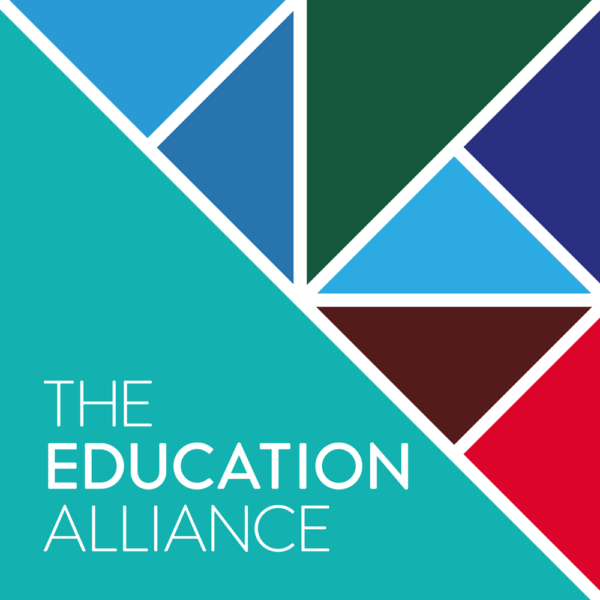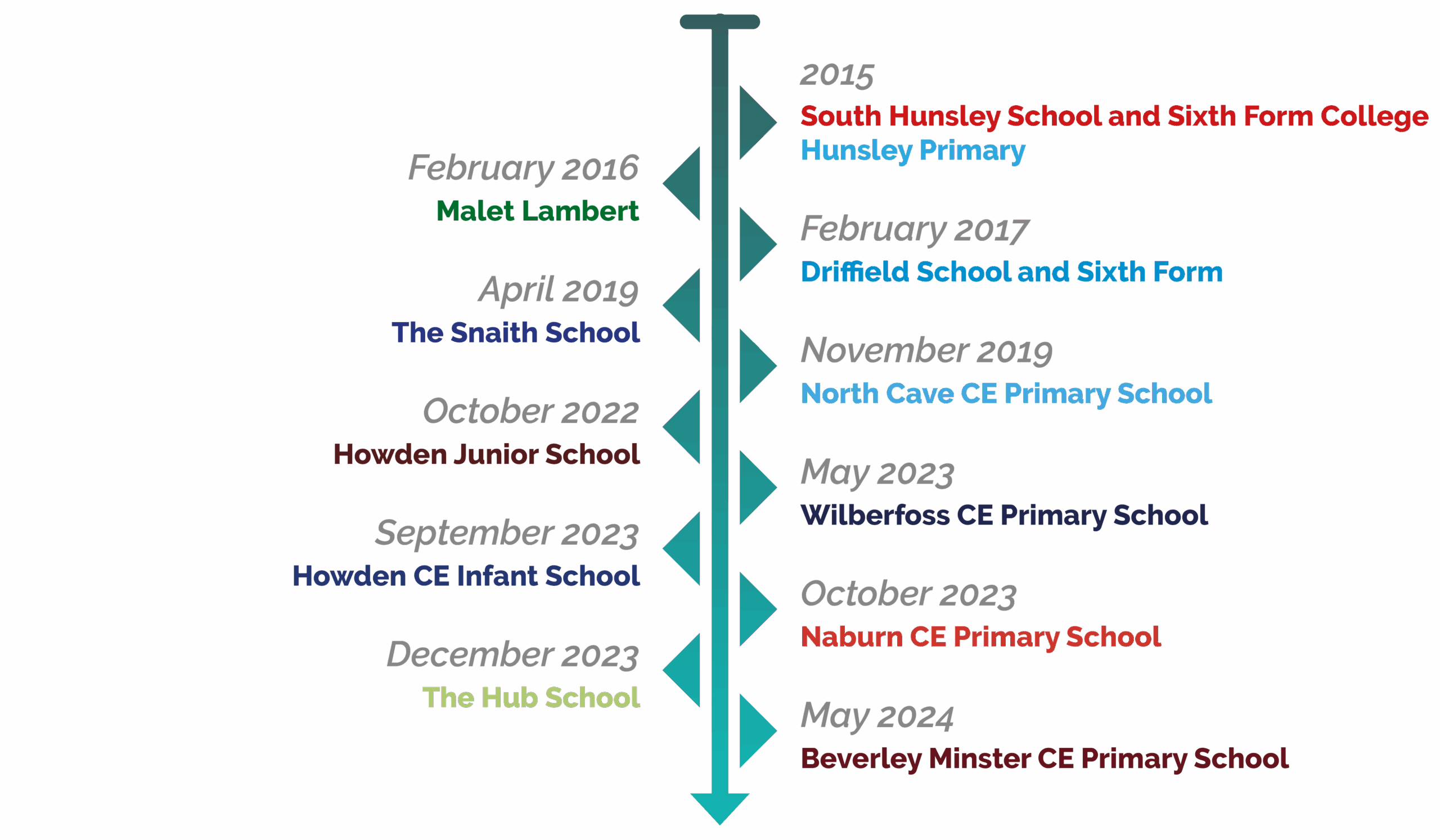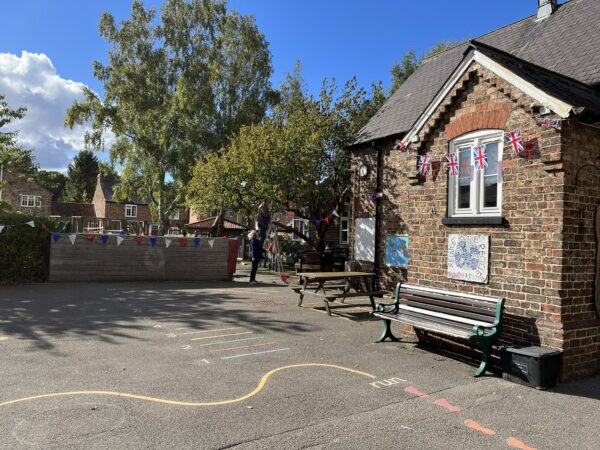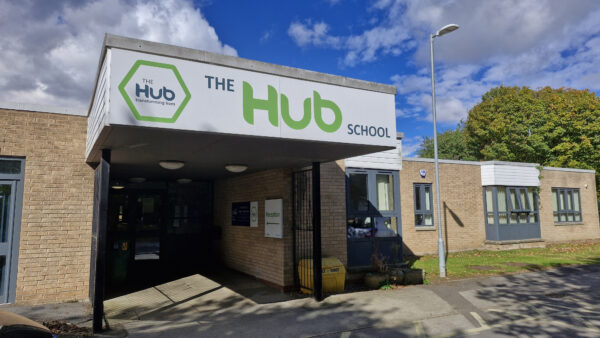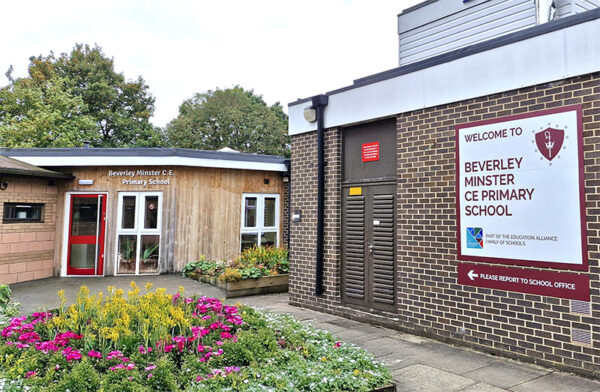Looking back over the 2023-24 academic year, we are especially proud of all of our staff and young people and what they have achieved. Staff worked with all of our young people to ensure that they achieved their potential and felt supported throughout the academic year.
This annual report captures some of our successes and outcomes along with what we feel are some of priorities for the forthcoming academic year. Download the full review here or see below for a summary.
Our Organisation
The Education Alliance Multi-Academy Trust was established in 2015 so that South Hunsley School and Sixth Form College could support the setting up of Hunsley Primary School, the East Riding’s first Free School. Since then, a further ten schools in the region have joined:
In addition to the twelve schools, the trust also operates Yorkshire Wolds Teacher Training, the only Outstanding SCITT based in East Yorkshire, which is training a new generation of primary and secondary teachers in East Riding and Hull.
Trust Growth
We are delighted that four schools have joined TEAL following successful due diligence and conversion periods. Howden CE Infant School were first to become part of the TEAL family on 1 September 2023. Lee Hill was appointed as Executive Headteacher at both Howden Junior School and Howden Infant School soon after, and has helped to grow a dynamic team across both schools with Claire Issit and Jane Hunt being appointed as Head of School respectively.
Naburn CE Primary School joined us on the 1 October 2023 as a sponsored academy, with Headteacher Kate Durham joining the school in the September 2023. Naburn is our first school based in York and is our smallest school with only 43 children on roll.
The Hub School joined TEAL shortly after, and since joining TEAL on 1 December 2023,The Hub School is an alternative provision school, providing commissioned places at both Key Stage 3 and Key Stage 4 over a split site. Since The Hub School joined us, Executive Headteacher Paul Grimes has since been appointed as Director of Inclusion for TEAL with Genevra Austin and Jack Rollo both being appointed as the Head of School for each site
The most recent school to become part of the TEAL family was Beverley Minster CE Primary School, with Headteacher Luke Fletcher and his team joining in May 2024. The school joined TEAL as a sponsored academy and it is our first school in the Beverley area.
We are thrilled to have all four schools on board and value the hard work and support their staff have provided during the conversion periods.
Governance
At the start of the academic year, an external review of the trust’s governance took place. This involved conversations with various TEAL staff, governors, trustees and members, as well as meeting observations and the assessment of all governance processes. Following the four-month review, we were delighted with the feedback received, and any recommendations shared within the report have since been considered and implemented to help further influence the education of our pupils. Thank you to all staff who were involved during the review.
The Autumn term of 2023 saw a change to our central governance structure. Due to the continuing growth of the trust, it was agreed outsourcing governance activities to York City Council would be more beneficial to our schools. Throughout the year, the York team worked well with our Headteachers and Chairs to build agendas, support with meetings and monitor the training of all members across the trust.
Throughout the year, we said goodbye to some of our long-standing members of the Trust Board and Sub-committees. Anne Barker, Paddy Hall and Andrew Steele played a huge role in TEAL’s growth and decision making and we thank them for all their support over the years.
YWTT also said farewell to Chris Abbott, Chair of the Strategic Board after completion of her term of office, Chris was the driving force behind the decision to launch YWTT and we wish to thank her for everything she has done.
TEAL Pupils & Students
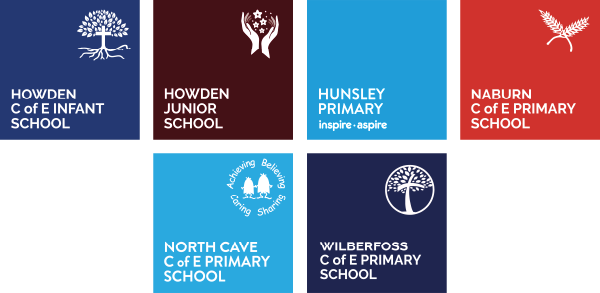
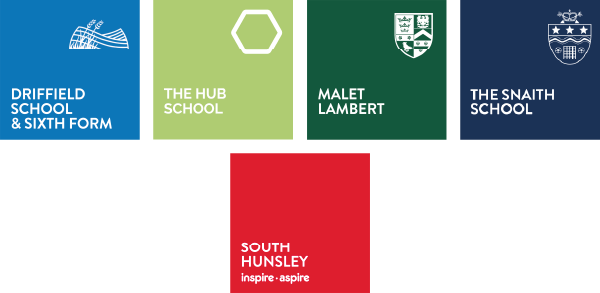

Team TEAL
27 New Teachers
Staffing remained stable throughout the academic year and retention rates have continued to be high. Teaching vacancies have continued to be advertised to Yorkshire Wolds Teacher Training colleagues where possible (in line with our trust policy).
Outcomes
As ever, we should congratulate all of our students for performing strongly across all our schools, having faced significant disruption before and during their GCSE years. This disruption included periods of lockdown, high levels of Covid-19 cases, regular isolation both individually and as cohorts. There can be little doubt that this has had a significant impact on student outcomes not just in our schools but across all schools nationally. This year saw more variability in outcomes across our schools, especially those where attendance has been more of a challenge; this pattern is repeated regionally and nationally.
Nationally, the pattern of results emerging shows that in schools and communities with higher levels of disadvantage and higher levels of absence, results have been lower. Conversely, where schools have a higher number of pupils who are not disadvantaged, had plenty of support outside school during the pandemic and have attended well, those pupils and schools have done well.
Year 1 Phonics pass rate = 82% / National = 80%
Year 6 achieving expected standards in RWM = 66% / National = 61%
Year 11 achieving English and maths at 4 or above = 67% / National = 65%
Year 11 disadvantaged pupils Attainment 8 = 35.5 / National = 35.0
Progress 8 = -0.05 / East Riding (-0.13) & Hull = (-0.52)
Year 11 grades at 9-7 = 19% / East Riding & Hull = 17%
Year 11 grades at 9-5 = 53% / East Riding & Hull = 50%
Sixth Form Average Points Score per A level = 34.5 / East Riding = 32.2
Emerging Priorities
We have our dedicated TEAL Strategy 2024-28 and to focus our work in the 5 key areas of our strategy, we wish to make a series of promises about what young people and adults who are party of the TEAL family will experience and what we will deliver for our communities and for the school system. These promises are intentionally highly ambitious; we may not achieve them all but for the next four years we will focus all our work on delivering them and it will become the mission of leaders, trustees and governors and everyone who works for TEAL to deliver this strategy and truly fulfil our core purpose.
By 2028 we will:
- 1Be a family of at least 15 schools across Yorkshire, delivering high-quality inclusive education to 8,000 young people and operating efficiently and effectively.
- 2Train 100 highly effective new teachers each year who are equipped for long, successful careers in schools.
- 3Train 10 future Headteachers for Yorkshire schools, who lead ethically and are deeply connected to their communities.
- 4Lead the sector in staff satisfaction and engagement.
- 5Deliver equally high-quality education and positive staff experience in each TEAL school.
- 6Have a school place for every young person in our communities and ensure the needs of all young people are met.
- 7Have a great teacher in every classroom, all of whom are committed to and capable of delivering high quality inclusive education.
- 8Lead the sector in retention of new entrants to the profession.
- 9Ensure every young person in a TEAL school feels seen, valued, heard and has a strong sense of belonging.
- 10Ensure all our young people read fluently, can fully access their curriculums and are equipped with strong literacy skills.
- 11Offer a high-quality programme of personal excellence and provide every young person enjoys at least one enrichment experience every year.
- 12Ensure all young people who attend TEAL schools gain good qualifications and thrive educationally.
- 13Ensure all young people who attend TEAL schools are on a pathway to higher education, an apprenticeship or a fulfilling job by the age of 19.
- 14Give all young people access to mental health support in our schools.
- 15Give all young people access to speech and language support.
- 16Operate early help and support services that reduce the burden on NHS and other services and place our schools at the heart of the communities we serve.
- 17Have contributed significantly to positive reform of the school system to make schools more inclusive
- 18Be an exemplar for high-quality inclusive education and be at the forefront of a network of trusts and other partners developing, promoting and supporting high-quality inclusive education.
